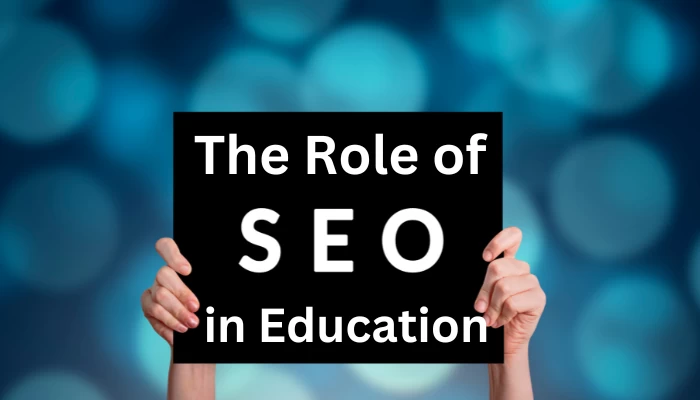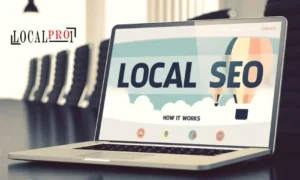Local SEO Services Near Me | Local Pro1 Welcome to...
Elevate Your Institution: Local Pro1’s Guide to Effective SEO for Higher Education
Elevate Your Institution| Local Pro1's Guide to Effective SEO for Higher Education
Search Engine Optimization (SEO) is vital to the visibility and relevance of a variety of online entities in the always changing digital ecosystem, including higher education. This introduction will delve into the definition of SEO for higher education and highlight its significance in the digital realm. Local Pro1 provides the best SEO for Higher Education services.

Definition of SEO for Higher Education
In higher education, search engine optimization, or SEO, refers to the technological and strategic methods used to improve an institution’s or program’s online exposure in search engine rankings. To comply with the algorithms employed by search engines like Google, Bing, and Yahoo, this entails optimizing websites, content, and other online assets.The goal is to improve rankings, increase organic traffic, and ultimately attract
Importance of SEO in the Digital Landscape:
The digital landscape has transformed how individuals seek information, make decisions, and engage with educational institutions. The importance of SEO in the higher education sector cannot be overstated due to several key reasons:
Increased Visibility and Traffic: Effective SEO strategies enhance the visibility of universities, colleges, and educational programs in search engine results. This increased visibility attracts more organic traffic, providing institutions with the opportunity to reach a broader audience.
Student Recruitment and Enrollment: Prospective students often turn to search engines when researching universities and programs. A strong SEO strategy ensures that educational institutions are prominently featured in search results, influencing students’ decision-making processes and increasing the likelihood of enrollment.
Competitive Advantage: In a competitive higher education landscape, SEO services as a tool for institutions to stand out. Institutions that invest in optimizing their online presence are more likely to attract attention and outrank competitors in search engine results.
Building Credibility and Trust: High-ranking search results are often associated with credibility and trustworthiness. Educational institutions may establish a positive online reputation and gain the trust of prospective students, parents, and other stakeholders by optimizing their content and following SEO best practices.
The Role of SEO in Education

Understanding the Basics of SEO:
Keyword Research:Effective SEO begins with thorough keyword research. Educational institutions should identify relevant keywords related to their programs, courses, and services. This helps in optimizing content to match the search queries of potential students.
Content Quality and Relevance:Creating high-quality, relevant content is fundamental to SEO success. Educational websites should provide valuable information, including details about courses, faculty, admission procedures, and campus life. Regularly updating content keeps the website fresh and engaging.
Technical SEO:Technical aspects such as website speed, mobile-friendliness, and secure connections are critical for SEO. Educational institutions must ensure their websites are technically sound to provide a positive user experience and satisfy search engine algorithms.
Tailoring SEO Strategies for Higher Education:
Local SEO for Colleges and Universities:Implementing local SEO strategies is essential for institutions targeting a specific geographic area. This involves optimizing Google My Business profiles, local citations, and ensuring accurate contact information to improve visibility in local search results.
Social Media Integration:Social media platforms are powerful tools for educational institutions. Integrating social media into SEO strategies can enhance online presence, improve brand awareness, and drive traffic to academic websites.
Utilizing Rich Snippets:Higher education websites can benefit from using rich snippets, which provide additional information in search results. Implementing structured data markup can enhance the visibility of courses, events, and other relevant information.
On-Page Optimization for Academic Websites:
Optimizing Page Titles and Meta Descriptions:Crafting compelling page titles and meta descriptions with relevant keywords can improve click-through rates from search engine results pages (SERPs). Each page should have a unique and descriptive title.
Header Tags and Content Structure:Proper use of header tags (H1, H2, etc.) and a well-structured content layout contribute to better user experience and improved SEO. Clear, organized content helps search engines understand the context of the information provided.
Image Optimization:Images are integral to educational websites. Optimizing images with descriptive filenames and alt text not only enhances accessibility but also contributes to better image search rankings.
Link Building and Its Impact on Educational SEO:
Building High-Quality Backlinks:Acquiring backlinks from authoritative and relevant sources is crucial for educational SEO. Collaborating with other institutions, industry partners, and creating shareable content can naturally attract valuable backlinks.
Internal Linking:Internal linking helps distribute link equity across pages on a website. Educational institutions should strategically link relevant pages within their site, making it easier for users and search engines to navigate and understand the site’s structure.
Monitoring and Adaptation:Continuous monitoring of the SEO landscape is essential. Institutions should regularly assess their SEO performance, adapt strategies based on algorithm updates, and stay informed about emerging trends in educational SEO.
Why is SEO Important for Higher Education?
SEO (Search Engine Optimization) is crucial for higher education institutions for various reasons. Two significant aspects are:
Increased Visibility:
- Prospective students often begin their search for educational opportunities online. SEO helps higher education institutions appear prominently in search engine results, increasing their visibility and attracting more potential students.
Competitive Advantage:
- The education sector is highly competitive. Effective SEO strategies can help institutions stand out from the competition, ensuring that their programs and offerings are easily discoverable by individuals seeking educational opportunities.
Targeted Traffic:
- SEO allows institutions to optimise their content for specific keywords and phrases relevant to their programs. This helps attract targeted traffic, ensuring that the website is visited by individuals interested in the courses and services offered.
Building Credibility and Trust:
- Institutions that appear at the top of search results are often perceived as more credible and trustworthy. Implementing SEO best practices can enhance an institution’s online reputation, making it a more appealing choice for potential students.
Cost-Effective Marketing:
- SEO provides a cost-effective way to market higher education institutions compared to traditional advertising methods. It helps in reaching a wider audience without the high costs associated with other marketing channels.
Adapting to Changing Trends:
- SEO is dynamic and requires continuous adaptation to changing search engine algorithms and user behaviour. Higher education institutions that invest in SEO stay agile and can adjust their strategies to align with evolving digital trends, ensuring sustained online visibility.
Mobile Optimization:
- As more people use mobile devices to access information, it’s crucial for higher education websites to be mobile-friendly. SEO efforts often include mobile optimization, making it easier for prospective students to access information on courses, admissions, and campus life from their smartphones or tablets.
Local Search Optimization:
- Many students search for educational opportunities within a specific geographic location. Local SEO ensures that higher education institutions appear in local search results, catering to students looking for options in their vicinity.
Improved User Experience:
- SEO is not just about keywords; it also focuses on creating a positive user experience. Institutions that prioritise user-friendly websites, fast loading times, and relevant content contribute to a positive online experience, encouraging prospective students to explore further.
Tracking and Analytics:
- SEO tools provide valuable data and analytics, allowing institutions to track the performance of their online efforts. This data can be used to refine strategies, understand user behaviour, and make data-driven decisions to enhance the overall digital presence.
Who Benefits Most from SEO in Higher Education?

All three entities—Educational Institutions, Prospective Students, and Faculty and Staff—stand to gain significant benefits from effective Search Engine Optimization (SEO) in higher education:
Educational Institutions:
Increased Visibility: SEO strategies enhance the online visibility of educational institutions. This is crucial for attracting prospective students, engaging alumni, and establishing a positive digital presence.
Enrollment and Recruitment: Improved search engine rankings increase the likelihood of prospective students discovering the institution’s programs, leading to higher enrollment rates. SEO contributes to a competitive advantage in the recruitment process.
Prospective Students:
Accessible Information: SEO ensures that prospective students can easily find relevant information about courses, admissions, scholarships, and campus life. This accessibility aids in making informed decisions about their educational journey.
User-Friendly Experience: SEO often involves optimising websites for user experience, leading to faster load times, mobile responsiveness, and overall improved usability.
Faculty and Staff:
Research and Academic Visibility: For faculty members, SEO can boost the visibility of research publications, academic achievements, and faculty profiles. This increased visibility can contribute to academic collaboration and partnerships.
Communication and Engagement: SEO strategies can facilitate effective communication within the academic community. Whether it’s sharing research updates, campus news, or event information, SEO ensures that the information reaches the intended audience.
Conclusion
In the field of higher education, search engine optimization, or SEO, is very important. It helps academic institutions, potential students, and faculty and staff. By enhancing online visibility, SEO contributes to the positive reputation of institutions, making it easier for prospective students to access essential information and make informed decisions. Feel free to contact us for any type of query or service related to SEO for Higher Education.
FAQs
What Is Seo, And Why Is It Important For Higher Education Institutions?
SEO, or Search Engine Optimization, is the practice of optimising a website to rank higher on search engine results. For higher education, effective SEO is crucial to increase online visibility, attract prospective students, and enhance overall digital presence.
How Can Seo Benefit Higher Education Institutions?
SEO can benefit higher education institutions by increasing organic traffic, improving online reputation, and helping in reaching and engaging with the target audience effectively. It also plays a key role in the enrollment process by ensuring that the institution is easily discoverable by potential students.
What Specific Seo Strategies Are Recommended For Higher Education Websites?
Key strategies include optimizing website content with relevant keywords, creating high-quality and shareable content, improving website structure and navigation, leveraging local SEO, and actively managing online reviews and testimonials.
How Does Keyword Research Contribute To Seo For Higher Education?
Keyword research helps identify the terms and phrases potential students use when searching for higher education institutions. By strategically incorporating these keywords into website content, institutions can enhance their chances of appearing in relevant search results.
How Important Is Mobile Optimization In The Context Of Seo For Higher Education?
Mobile optimization is critical for SEO in higher education as a significant portion of users access websites through mobile devices. Search engines prioritise mobile-friendly websites, and a seamless mobile experience can positively impact rankings and user satisfaction.
Our Services
Our Latest Posts
PPC White Label Services by Local Pro1 | Expert Solutions
PPC White Label Services by Local Pro1 | Expert Solutions...



